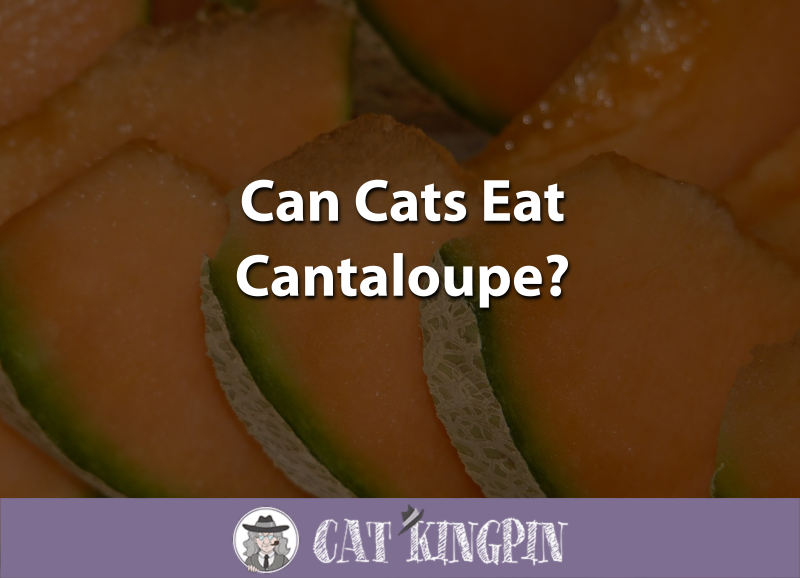Can Cats Eat Cantaloupe?
Cantaloupe is a healthy and tasty melon that many people enjoy eating. If you like cantaloupe yourself, you may be wondering if cantaloupe would be a good snack for your cat.
As we will see, cantaloupe is generally a safe treat for your cat. However, unlike for people, fruits like cantaloupe aren’t very important to maintaining your cat’s health.
In this article we’ll cover the following:
- Cats and Cantaloupe, What You Need to Know
- Can Cats Eat Cantaloupe?
- Can Kittens Eat Cantaloupe?
- Benefits/Drawbacks to Cats Eating Cantaloupe
- Healthy Alternatives to Cantaloupe for Cats
Cats and Cantaloupe, What You Need to Know
Cantaloupe is one of a particular type of fruits we call melons. Others include sugar melons, honeydew, casaba, cucumbers, and watermelons.
Also known as muskmelons, cantaloupes originated in the region between Africa and India before being introduced to Europe. Cantaloupe was first grown as a commercial crop in the United States around 1890, and has been popular ever since.
By weight, cantaloupes are about 90% water. The remainder is primarily carbohydrates, the bulk of which is sugar with a small amount of fiber.
Cantaloupe does contain relatively high amounts of vitamins A and C. Coupled with the fact they contain very little fat, cantaloupes are considered to be an extremely healthy food for people to eat.
As far as cats go, a quick YouTube search will show that quite a few cats really love cantaloupe. Let’s look take a look at one cantaloupe-loving cat right now:
Can Cats Eat Cantaloupe?
Yes, your cat can eat cantaloupe! Cantaloupe can be a tasty and fun treat for your cat, if your cat is interested in it. Since cats don’t generally like sweet things, don’t be surprised if your cat simply isn’t interested in cantaloupe.
The main thing to remember is that you need to wash the outside of the cantaloupe before cutting it open and giving it to your cat. Also, you need to limit how much cantaloupe your cat eats because too much can cause digestive problems.
Can Kittens Eat Cantaloupe?
Kittens tend to be even more susceptible than adult cats to most things because they are tiny and have not yet fully developed. Toxins and bacteria found on the skin of a cantaloupe are even more likely to make a kitten sick than an adult cat.
Instead of canteloupe, why not try giving your kitten a healthy kitten food like Blue Wilderness kitten food? This type of food has everything your kitten needs to grow up big and strong, and without anything that could cause harm.
Benefits/Drawbacks to Cats Eating Cantaloupe
While cantaloupe is generally a safe snack for your cat, you should know that they won’t really benefit much nutritionally from eating cantaloupe. This is because cats are obligate carnivores, which means all cats really need to eat is meat. In fact, cats actually are very poor at deriving nutrition from foods that aren’t meat.
For example, humans don’t produce enough vitamin C in their livers, so they must eat oranges, grapefruit, and other vitamin C-rich foods or they will end up getting scurvy.
While cats need vitamin C to survive, they generally don’t need any additional vitamin C added to their diets. This is because cats make plenty of vitamin C in their own livers, so they don’t need to eat fruits like cantaloupe to get enough. It won’t hurt your cat to get a little extra, they just don’t require it.
Similarly, cantaloupe contains a small amount of fiber. Cats don’t need fiber in their diet, and eating food containing fiber can have a laxative effect on cats.
The main concern is that the surface of cantaloupes can contain harmful bacteria, such as Salmonella. While Salmonella does not seem to affect cats as severely as humans, they can still suffer from a variety of symptoms when sickened by the bacteria, including:
- High fever
- Lack of appetite
- Vomiting
- Diarrhea
- Abdominal pain
- Dehydration
In severe cases, life-threatening septicaemia and endotoxemia may develop. In rare cases the infection may spread to different organs causing pneumonia, meningitis, and abortion in pregnant queens.
To be safe, you should wash and scrub the outside of the cantaloupe thoroughly before cutting it up and giving it to your cat. Any leftover fruit should be refrigerated after cutting it and consumed in less than three days to reduce the risk of poisoning by bacterial pathogens.
Healthy Alternatives to Cantaloupe for Cats
There are main healthy alternatives to feeding your cat cantaloupe. If your grocer happens to be out, perhaps you can try a different type of melon.
Berries can also be healthy and fun for your cat. What’s most important, though, is to make sure your cat is eating a healthy, high-quality, meat-based cat food like Blue Wilderness High Protein Grain-Free Cat Food.
So, Can Cats Eat Cantaloupe?
Now you know that cats can eat cantaloupe. If you decide to give you cat or kitten cantaloupe, just follow these simple steps:
- Wash the outside of your cantaloupe thoroughly before cutting it or giving it to your cat.
- Give cantaloupe to your cat in moderation as too much could cause your cat to have indigestion and loose stools for a day or two.
- Refrigerate any unused melon and do not keep any cut cantaloupe beyond three days.
- Make sure a high-quality cat food like Blue Wilderness High Protein Grain-Free Cat Food makes up the majority of your cat’s diet as it will provide all the nutrients your cat needs.
- Another healthy treat for cats is these Wellness Kittles Cat Treats with Chicken and Cranberries, the perfect sweet treat for cats that love cantaloupe but have already had enough!
Okay, before we go, let’s go ahead and watch one more video of cats enjoying cantaloupe:
If you have any questions or would like to share a story about your cat and cantaloupe, please tell us in the comments below. We’d love to hear from you!






